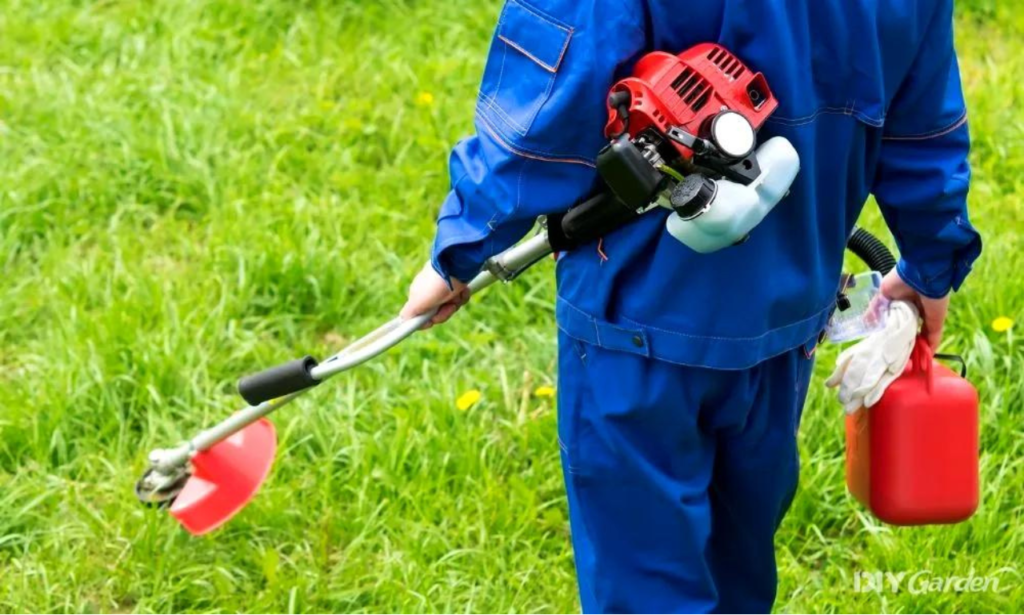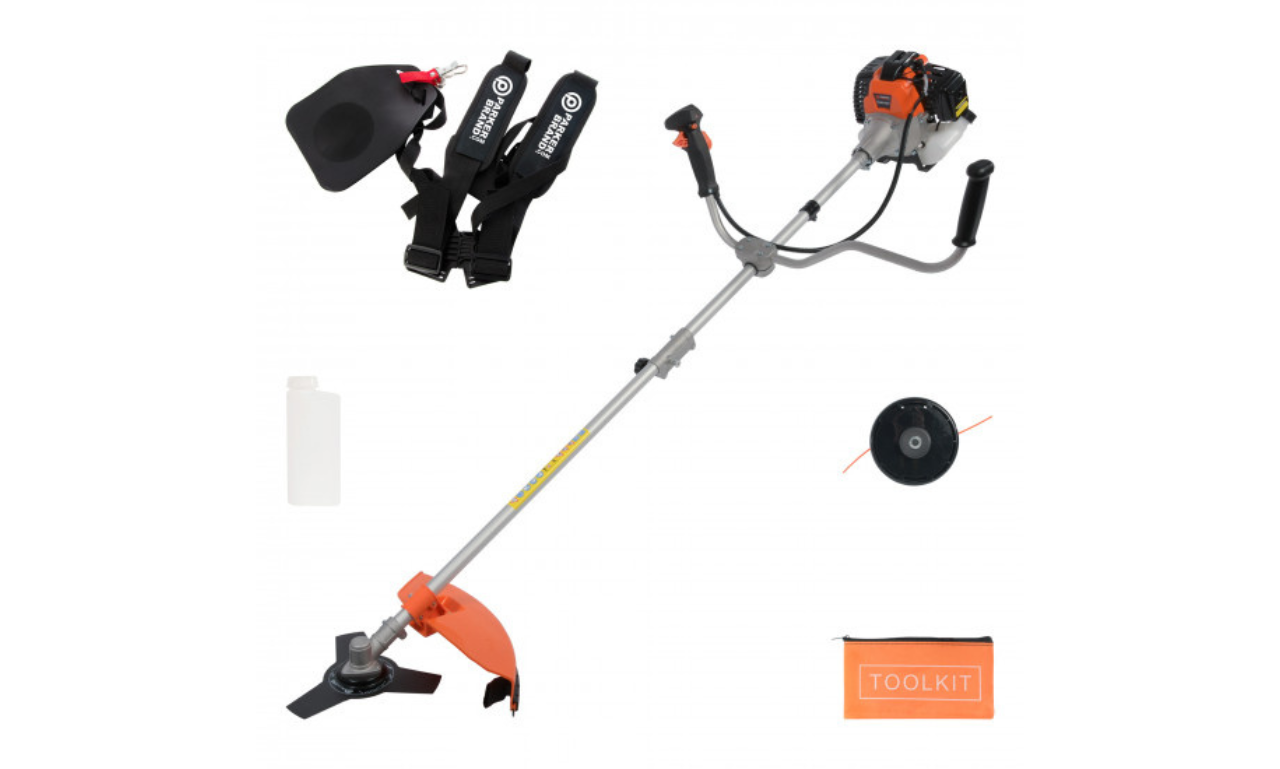A well-maintained garden is a source of pride for many homeowners. However, achieving that pristine look often requires more than just a lawnmower. If you’re dealing with tough weeds, overgrown grass, or thick vegetation, a petrol strimmer can be a game changer. This versatile gardening tool is a go-to for anyone looking to keep their garden neat and tidy without much hassle. In this article, we’ll dive deep into what a petrol strimmer is, how it works, the benefits it offers, and how to choose the right one for your needs.
What is a Petrol Strimmer?

A petrol strimmer, also known as a grass trimmer or brush cutter, is a handheld garden tool used for cutting grass, weeds, and light undergrowth in areas that are difficult to reach with a lawnmower. Unlike electric strimmers, a petrol strimmer is powered by a petrol engine, giving it more power and mobility. These tools are especially effective in large gardens, areas with thick vegetation, or places where electric power sources may be hard to access.
How Does a Petrol Strimmer Work?
A petrol strimmer operates using a rotating cutting head, which can be fitted with either a nylon line or a metal blade. When the engine is activated, the cutting head spins at high speed, allowing it to slice through grass, weeds, and even small bushes. Petrol strimmers are generally more powerful than their electric counterparts, making them ideal for more demanding garden tasks.
The primary components of a petrol strimmer include:
- Engine: The petrol engine powers the strimmer and can vary in size, depending on the model.
- Shaft: The long shaft connects the engine to the cutting head. Some models have a straight shaft, while others have a curved one.
- Cutting head: The cutting head holds the line or blade used to trim vegetation.
- Throttle: The throttle controls the speed of the cutting head, allowing for more precision in cutting.
Why Choose a Petrol Strimmer?
There are several reasons why a petrol strimmer may be the ideal choice for your gardening needs:
1. More Power and Flexibility
One of the biggest advantages of a petrol strimmer is its power. Petrol engines can handle tougher tasks like cutting through thick weeds and dense vegetation, which would otherwise be difficult for an electric or battery-powered strimmer. The increased power also means that a petrol strimmer can cover larger areas faster and more efficiently.
2. No Dependence on Electric Power
If you have a large garden or work in areas where electric outlets are scarce, a petrol strimmer offers complete mobility. You won’t need to worry about dragging extension cords or running out of battery power in the middle of a job. Simply fill the petrol tank, and you’re good to go.
3. Long-Lasting Durability
Most petrol strimmers are built to withstand tough conditions, making them a durable and long-lasting option. The sturdy construction of these machines makes them ideal for professional landscapers, gardeners, or anyone who regularly tackles heavy-duty trimming tasks.
4. Versatility
A petrol strimmer can be fitted with different types of cutting heads depending on the job. Nylon line heads are perfect for trimming grass and light vegetation, while metal blades are better suited for thicker undergrowth and even small saplings. This versatility means you can use the same tool for a wide range of gardening tasks.
Types of Petrol Strimmers
When choosing a petrol strimmer, it’s important to consider the type that best fits your needs. There are three main types:
1. Straight Shaft Petrol Strimmer
This type of strimmer features a straight shaft, which is ideal for reaching under bushes, hedges, or other hard-to-reach areas. It’s often more powerful than curved shaft models and is commonly used by professionals for tougher jobs.
2. Curved Shaft Petrol Strimmer
Curved shaft strimmers are lighter and easier to handle, making them perfect for residential use. They offer better balance and are generally more comfortable for prolonged use. These models are ideal for trimming grass and light weeds in smaller gardens.
3. Brush Cutter
Technically, a brush cutter is a more robust version of a petrol strimmer. It is designed to handle thick, overgrown vegetation and can be fitted with metal blades for cutting through woody plants and small trees. Brush cutters are best suited for heavy-duty tasks and are often used in professional landscaping.
How to Choose the Best Petrol Strimmer
With so many models on the market, choosing the right petrol strimmer can feel overwhelming. Here are a few key factors to consider:
1. Engine Size and Power
The power of a petrol strimmer is measured in cubic centimeters (cc). The larger the engine, the more powerful the tool will be. For light trimming tasks, a 25-30cc engine should suffice. However, if you need to tackle tougher jobs, opt for a model with a 40cc engine or larger.
2. Cutting Head
Consider whether you’ll be primarily using a nylon line or metal blade. Nylon line heads are best for grass and lighter vegetation, while metal blades are better for dense undergrowth and brush.
3. Weight and Comfort
Petrol strimmers tend to be heavier than electric models, so it’s important to choose one that feels comfortable to use. Many models come with harnesses to help distribute the weight evenly, reducing fatigue during longer trimming sessions. Be sure to check the weight and balance of the strimmer before purchasing.
4. Fuel Efficiency
Some petrol strimmers come with features designed to improve fuel efficiency, such as adjustable throttles and easy start systems. If you plan on using the strimmer frequently, choosing a fuel-efficient model can save you money in the long run.
5. Vibration and Noise Levels
Petrol engines can be noisy and produce vibrations, which can be tiring during long periods of use. Look for models with vibration dampening features and quieter engines to reduce discomfort while trimming.
Maintenance Tips for Petrol Strimmers
To keep your petrol strimmer running smoothly and extend its lifespan, proper maintenance is essential. Here are a few maintenance tips to ensure optimal performance:
1. Regularly Check the Air Filter
The air filter prevents dirt and debris from entering the engine. Over time, it can become clogged and reduce the strimmer’s performance. Be sure to clean or replace the air filter regularly to keep your engine running efficiently.
2. Use the Right Fuel Mixture
Most petrol strimmers require a mix of petrol and two-stroke oil. Check your owner’s manual for the correct ratio, and always use fresh, high-quality fuel to avoid damaging the engine.
3. Sharpen or Replace the Cutting Head
If your petrol strimmer uses a metal blade, it’s important to keep it sharp for efficient cutting. Regularly inspect the blade for wear and replace it when necessary. If you’re using a nylon line head, make sure the line is properly loaded and replace it when it becomes worn down.
4. Inspect the Spark Plug
A dirty or worn spark plug can prevent your petrol strimmer from starting or running smoothly. Check the spark plug regularly and replace it if you notice any buildup of carbon or corrosion.
5. Store Properly
When not in use, store your petrol strimmer in a dry, sheltered area. Drain the fuel if you won’t be using the tool for an extended period to prevent fuel from going stale and damaging the engine.
Safety Tips for Using a Petrol Strimmer
Using a petrol strimmer can be dangerous if not handled properly. Here are some safety precautions to follow:
- Wear protective gear: Always wear safety goggles, ear protection, gloves, and long sleeves to protect yourself from flying debris.
- Check the area: Before starting, make sure the area is clear of obstacles like rocks, glass, or metal objects that could damage the cutting head.
- Hold firmly: Keep both hands on the strimmer and maintain a firm grip to control the tool during operation.
- Work in open areas: Avoid using a petrol strimmer in confined or enclosed spaces due to the fumes from the petrol engine.
- Never refuel while hot: Always let the engine cool down before refueling to avoid the risk of fire.
Conclusion
A petrol strimmer is an indispensable tool for keeping your garden looking its best, especially in areas where a lawnmower can’t reach. With its powerful engine, versatile cutting options, and mobility, it’s ideal for both light trimming and heavy-duty gardening tasks. By choosing the right model, maintaining it properly, and following safety precautions, you can ensure that your petrol strimmer will serve you well for years to come. Whether you’re a professional landscaper or a weekend gardener, a petrol strimmer is a reliable ally in your quest for a beautifully maintained outdoor space.
Here are 10 frequently asked questions (FAQs) related to petrol strimmers:
- What is a petrol strimmer? A petrol strimmer is a garden tool powered by a gasoline engine, used for cutting grass, weeds, and small plants, especially in areas where a lawnmower can’t reach.
- How do I start a petrol strimmer? To start a petrol strimmer, you usually need to press the primer bulb, adjust the choke, and pull the starter cord until the engine starts.
- What type of fuel does a petrol strimmer use? Most petrol strimmers use a mixture of unleaded petrol and 2-stroke oil. The typical ratio is 50:1 or 40:1, depending on the manufacturer’s recommendation.
- What maintenance does a petrol strimmer require? Regular maintenance includes cleaning the air filter, checking the spark plug, sharpening the cutting line or blades, and ensuring the fuel mixture is correct.
- How long does a petrol strimmer last on a full tank of fuel? The duration varies based on engine size and workload, but most petrol strimmers run for 30 minutes to 1 hour on a full tank.
- Why is my petrol strimmer not starting? Common reasons include a clogged air filter, old fuel, a dirty spark plug, or issues with the fuel-to-oil mixture.
- Can I use a petrol strimmer for edging? Yes, many petrol strimmers can be used for edging by adjusting the angle of the strimmer head to trim along garden borders and pathways.
- What’s the difference between a petrol strimmer and a brush cutter? A petrol strimmer is generally used for lighter grass and weeds, while a brush cutter is more powerful and can handle thicker vegetation and even small saplings.
- How do I replace the cutting line on a petrol strimmer? To replace the cutting line, you need to open the strimmer head, wind the new line onto the spool, and then feed it through the head’s eyelets.
- Are petrol strimmers more powerful than electric strimmers? Yes, petrol strimmers are generally more powerful and suitable for larger or tougher garden tasks compared to electric models. However, they require more maintenance and produce emissions.


